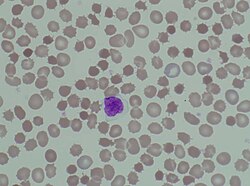Neuroacanthocytosis

Editor-In-Chief: Prab R Tumpati, MD
Obesity, Sleep & Internal medicine
Founder, WikiMD Wellnesspedia &
W8MD's medical weight loss NYC, sleep center NYC
Philadelphia medical weight loss and Philadelphia sleep clinics
| Neuroacanthocytosis | |
|---|---|

| |
| Synonyms | N/A |
| Pronounce | N/A |
| Specialty | N/A |
| Symptoms | Movement disorders, Chorea, Dystonia, Seizures, Cognitive decline |
| Complications | N/A |
| Onset | Typically in adulthood |
| Duration | Chronic |
| Types | N/A |
| Causes | Genetic mutations (e.g., VPS13A, KCTD17) |
| Risks | Family history of neuroacanthocytosis |
| Diagnosis | Genetic testing, Blood smear |
| Differential diagnosis | Huntington's disease, Wilson's disease, Parkinson's disease |
| Prevention | N/A |
| Treatment | Symptomatic management, Physical therapy, Speech therapy |
| Medication | N/A |
| Prognosis | Progressive, variable |
| Frequency | Rare |
| Deaths | N/A |
A group of rare genetic disorders affecting the nervous system and red blood cells
Neuroacanthocytosis refers to a group of rare genetic disorders characterized by the presence of acanthocytes in the blood and neurological symptoms. These disorders are typically progressive and can affect various systems in the body, particularly the nervous system.
Overview[edit]
Neuroacanthocytosis syndromes are a collection of disorders that share common features, including movement disorders, cognitive decline, and psychiatric symptoms. The presence of acanthocytes, which are spiculated red blood cells, is a hallmark of these conditions. The disorders are genetically heterogeneous, meaning they can be caused by mutations in different genes.
Types of Neuroacanthocytosis[edit]
There are several types of neuroacanthocytosis, each with distinct genetic causes and clinical features:
Chorea-acanthocytosis[edit]
Chorea-acanthocytosis is an autosomal recessive disorder caused by mutations in the VPS13A gene. It is characterized by chorea, which is a type of involuntary movement, as well as cognitive and behavioral changes. Patients may also experience seizures and myopathy.
McLeod syndrome[edit]
McLeod syndrome is an X-linked recessive disorder associated with mutations in the XK gene. It is characterized by movement disorders, peripheral neuropathy, and cardiomyopathy. Acanthocytes are present in the blood, and affected individuals may also have elevated levels of creatine kinase.
Pantothenate kinase-associated neurodegeneration[edit]
Pantothenate kinase-associated neurodegeneration (PKAN) is caused by mutations in the PANK2 gene. It is characterized by progressive dystonia, parkinsonism, and iron accumulation in the brain. Although acanthocytes may be present, they are not as prominent as in other neuroacanthocytosis syndromes.
Other forms[edit]
Other forms of neuroacanthocytosis include Huntington's disease-like 2 and aceruloplasminemia, which have overlapping features with the aforementioned disorders but are caused by different genetic mutations.
Symptoms[edit]
The symptoms of neuroacanthocytosis can vary widely depending on the specific disorder but often include:
- Movement disorders such as chorea, dystonia, and parkinsonism
- Cognitive decline and dementia
- Psychiatric symptoms such as depression and psychosis
- Seizures
- Muscle weakness and atrophy
Diagnosis[edit]
Diagnosis of neuroacanthocytosis involves a combination of clinical evaluation, blood tests to detect acanthocytes, and genetic testing to identify specific mutations. Magnetic resonance imaging (MRI) of the brain may also be used to assess structural changes.
Treatment[edit]
There is currently no cure for neuroacanthocytosis, and treatment is primarily supportive and symptomatic. Management may include:
- Medications to control movement disorders and psychiatric symptoms
- Physical therapy to maintain mobility
- Occupational therapy to assist with daily activities
- Genetic counseling for affected families
Prognosis[edit]
The prognosis for individuals with neuroacanthocytosis varies depending on the specific disorder and its severity. These conditions are generally progressive, leading to increasing disability over time.
See also[edit]
Ad. Transform your life with W8MD's Budget GLP-1 injections from $75


W8MD offers a medical weight loss program to lose weight in Philadelphia. Our physician-supervised medical weight loss provides:
- Weight loss injections in NYC (generic and brand names):
- Zepbound / Mounjaro, Wegovy / Ozempic, Saxenda
- Most insurances accepted or discounted self-pay rates. We will obtain insurance prior authorizations if needed.
- Generic GLP1 weight loss injections from $75 for the starting dose.
- Also offer prescription weight loss medications including Phentermine, Qsymia, Diethylpropion, Contrave etc.
NYC weight loss doctor appointmentsNYC weight loss doctor appointments
Start your NYC weight loss journey today at our NYC medical weight loss and Philadelphia medical weight loss clinics.
- Call 718-946-5500 to lose weight in NYC or for medical weight loss in Philadelphia 215-676-2334.
- Tags:NYC medical weight loss, Philadelphia lose weight Zepbound NYC, Budget GLP1 weight loss injections, Wegovy Philadelphia, Wegovy NYC, Philadelphia medical weight loss, Brookly weight loss and Wegovy NYC
|
WikiMD's Wellness Encyclopedia |
| Let Food Be Thy Medicine Medicine Thy Food - Hippocrates |
Medical Disclaimer: WikiMD is not a substitute for professional medical advice. The information on WikiMD is provided as an information resource only, may be incorrect, outdated or misleading, and is not to be used or relied on for any diagnostic or treatment purposes. Please consult your health care provider before making any healthcare decisions or for guidance about a specific medical condition. WikiMD expressly disclaims responsibility, and shall have no liability, for any damages, loss, injury, or liability whatsoever suffered as a result of your reliance on the information contained in this site. By visiting this site you agree to the foregoing terms and conditions, which may from time to time be changed or supplemented by WikiMD. If you do not agree to the foregoing terms and conditions, you should not enter or use this site. See full disclaimer.
Credits:Most images are courtesy of Wikimedia commons, and templates, categories Wikipedia, licensed under CC BY SA or similar.
Translate this page: - East Asian
中文,
日本,
한국어,
South Asian
हिन्दी,
தமிழ்,
తెలుగు,
Urdu,
ಕನ್ನಡ,
Southeast Asian
Indonesian,
Vietnamese,
Thai,
မြန်မာဘာသာ,
বাংলা
European
español,
Deutsch,
français,
Greek,
português do Brasil,
polski,
română,
русский,
Nederlands,
norsk,
svenska,
suomi,
Italian
Middle Eastern & African
عربى,
Turkish,
Persian,
Hebrew,
Afrikaans,
isiZulu,
Kiswahili,
Other
Bulgarian,
Hungarian,
Czech,
Swedish,
മലയാളം,
मराठी,
ਪੰਜਾਬੀ,
ગુજરાતી,
Portuguese,
Ukrainian